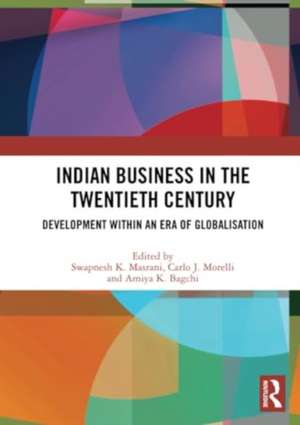Indian Business in the Twentieth Century: Development within an Era of Globalisation
Editat de Swapnesh K. Masrani, Carlo J. Morelli, Amiya K. Bagchien Limba Engleză Paperback – 27 mai 2024
The Indian economy has undergone a dramatic transformation to become one of the leading global economies of the twenty-first century. After ending colonialisation and gaining independence in 1947, the economy moved from a reliance on the export of raw materials to an era of state-promoted development, followed by an era of liberalisation and integration in the world economy by the close of the twentieth century. This book looks at traditional industries, such as textiles, to industries of the second and third industrial revolution, ranging from chemicals and oils to telecommunications.
This book highlights how Indian businesses proved capable of importing both new managerial ideas and organisational developments while adapting them to the specific domestic context. The case studies underline the use of human resource management in the post-colonial ‘indianisation’ of foreign-owned multinationals and the rise of new business organisation and management training in the development of Indian multinational organisations such as Tata Sons.
The chapters in this book were originally published as a special issue of Business History.
| Toate formatele și edițiile | Preț | Express |
|---|---|---|
| Paperback (1) | 382.18 lei 6-8 săpt. | |
| Taylor & Francis – 27 mai 2024 | 382.18 lei 6-8 săpt. | |
| Hardback (1) | 1000.27 lei 6-8 săpt. | |
| Taylor & Francis – 29 sep 2022 | 1000.27 lei 6-8 săpt. |
Preț: 382.18 lei
Nou
Puncte Express: 573
Preț estimativ în valută:
73.13€ • 76.36$ • 60.39£
73.13€ • 76.36$ • 60.39£
Carte tipărită la comandă
Livrare economică 15-29 aprilie
Preluare comenzi: 021 569.72.76
Specificații
ISBN-13: 9781032329383
ISBN-10: 1032329386
Pagini: 158
Dimensiuni: 174 x 246 mm
Greutate: 0.28 kg
Ediția:1
Editura: Taylor & Francis
Colecția Routledge
Locul publicării:Oxford, United Kingdom
ISBN-10: 1032329386
Pagini: 158
Dimensiuni: 174 x 246 mm
Greutate: 0.28 kg
Ediția:1
Editura: Taylor & Francis
Colecția Routledge
Locul publicării:Oxford, United Kingdom
Public țintă
Postgraduate and UndergraduateNotă biografică
Swapnesh K. Masrani is Assistant Professor at the Edinburgh Business School, Heriot Watt University, Edinburgh, UK. His research interest is in the area of Strategic Management and Management History, particularly the evolution of management practice in India during twentieth century, history of management education, and family business. He is also interested in using capability approach, path dependency, and institutional theory.
Carlo J. Morelli is Senior Lecturer in Business and Economic History at the University of Dundee. Carlo is interested in the generation of wealth in society and its re-distribution. His research examines industrial organisation and business/government relationships in the twentieth century. Current research in this area looks at our understanding of industrial decline, the jute and textile industries, and industrial transformation in Anglo-Indian economic relationships.
Amiya K. Bagchi is currently Emeritus Professor at the Institute of Development Studies, Kolkata, India and Adjunct Professor at Monash University, Australia. He has taught and researched in the areas of economics and economic and social history since 1958. He has been awarded honorary doctorates by three universities in India and by Roskilde University, Denmark. His latest edited volumes are (jointly with Anthony D’Costa) Transformation and Development: the political economy of development in India and China, (2012) and (jointly with Amita Chatterjee) is Marxism With and Beyond Marx (Routledge, 2014). He was the lead consultant for Asia and the Pacific: A Story of Transformation and Resurgence, Economic and Social Survey of Asia and the Pacific 1947-2014 (United Nations, 2014).
Carlo J. Morelli is Senior Lecturer in Business and Economic History at the University of Dundee. Carlo is interested in the generation of wealth in society and its re-distribution. His research examines industrial organisation and business/government relationships in the twentieth century. Current research in this area looks at our understanding of industrial decline, the jute and textile industries, and industrial transformation in Anglo-Indian economic relationships.
Amiya K. Bagchi is currently Emeritus Professor at the Institute of Development Studies, Kolkata, India and Adjunct Professor at Monash University, Australia. He has taught and researched in the areas of economics and economic and social history since 1958. He has been awarded honorary doctorates by three universities in India and by Roskilde University, Denmark. His latest edited volumes are (jointly with Anthony D’Costa) Transformation and Development: the political economy of development in India and China, (2012) and (jointly with Amita Chatterjee) is Marxism With and Beyond Marx (Routledge, 2014). He was the lead consultant for Asia and the Pacific: A Story of Transformation and Resurgence, Economic and Social Survey of Asia and the Pacific 1947-2014 (United Nations, 2014).
Cuprins
1. The rise of Indian business in the global context in the twentieth century: A review and introduction 2. Reassessing FERA: Examining British firms’ strategic responses to ‘Indianisation’ 3. Regulating the post-independence textile trade: Anglo-Indian tariff negotiations from independence to the Multi-Fibre Arrangement 4. Internationalisation of the Indian telecommunication industry (1947–2004): A firm-level perspective 5. Internment as a business challenge: Political risk management and German multinationals in Colonial India (1914–1947) 6. Ambiguous decolonisation: a postcolonial reading of the IHRM strategy of the Burmah Oil Company 7. Getting together, living together, thinking together: Management development at Tata Sons 1940–1960
Descriere
This book uses a combination of business history and political economy to chart the development of Indian business organisation from independence in 1947 through to the twenty-first century.
